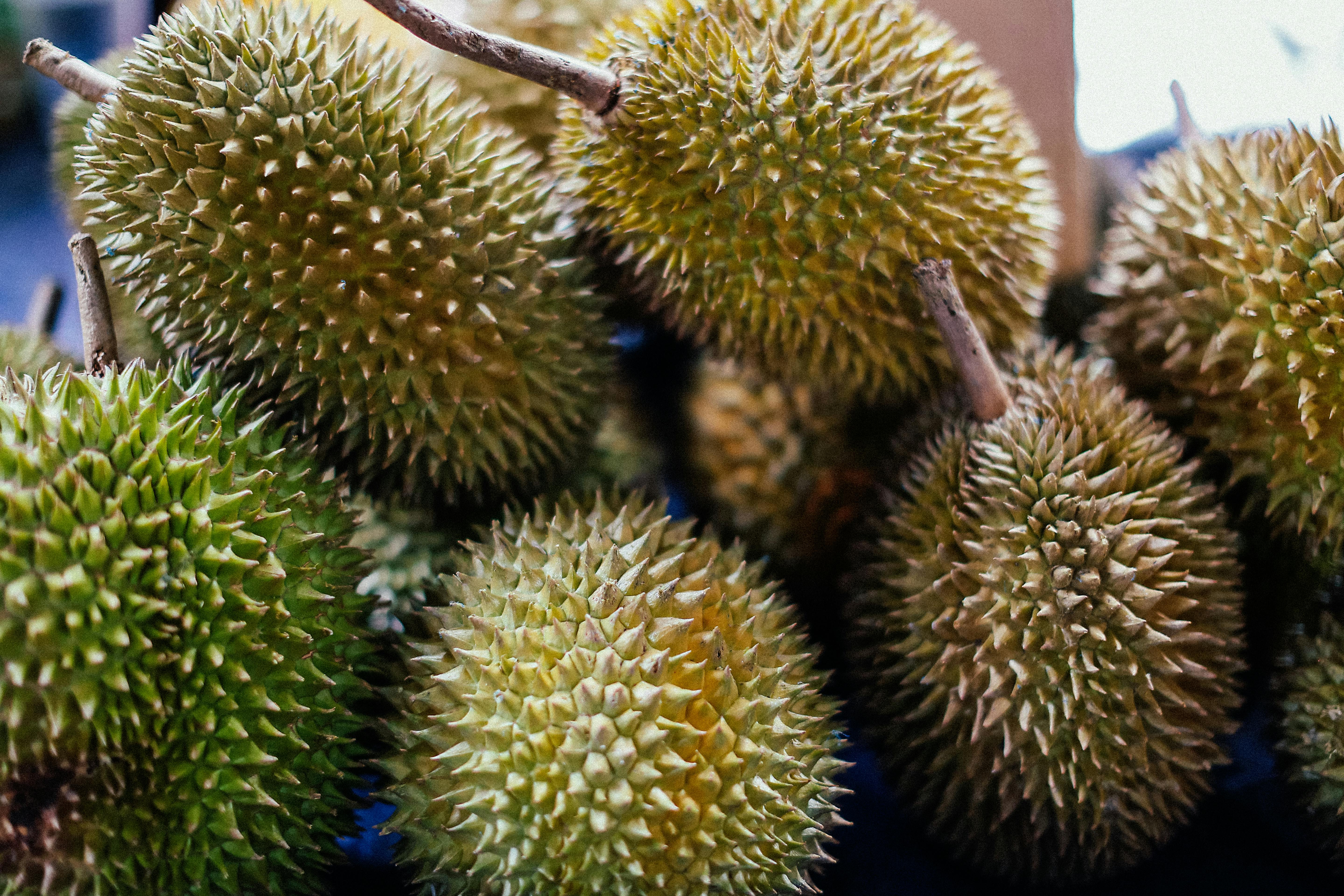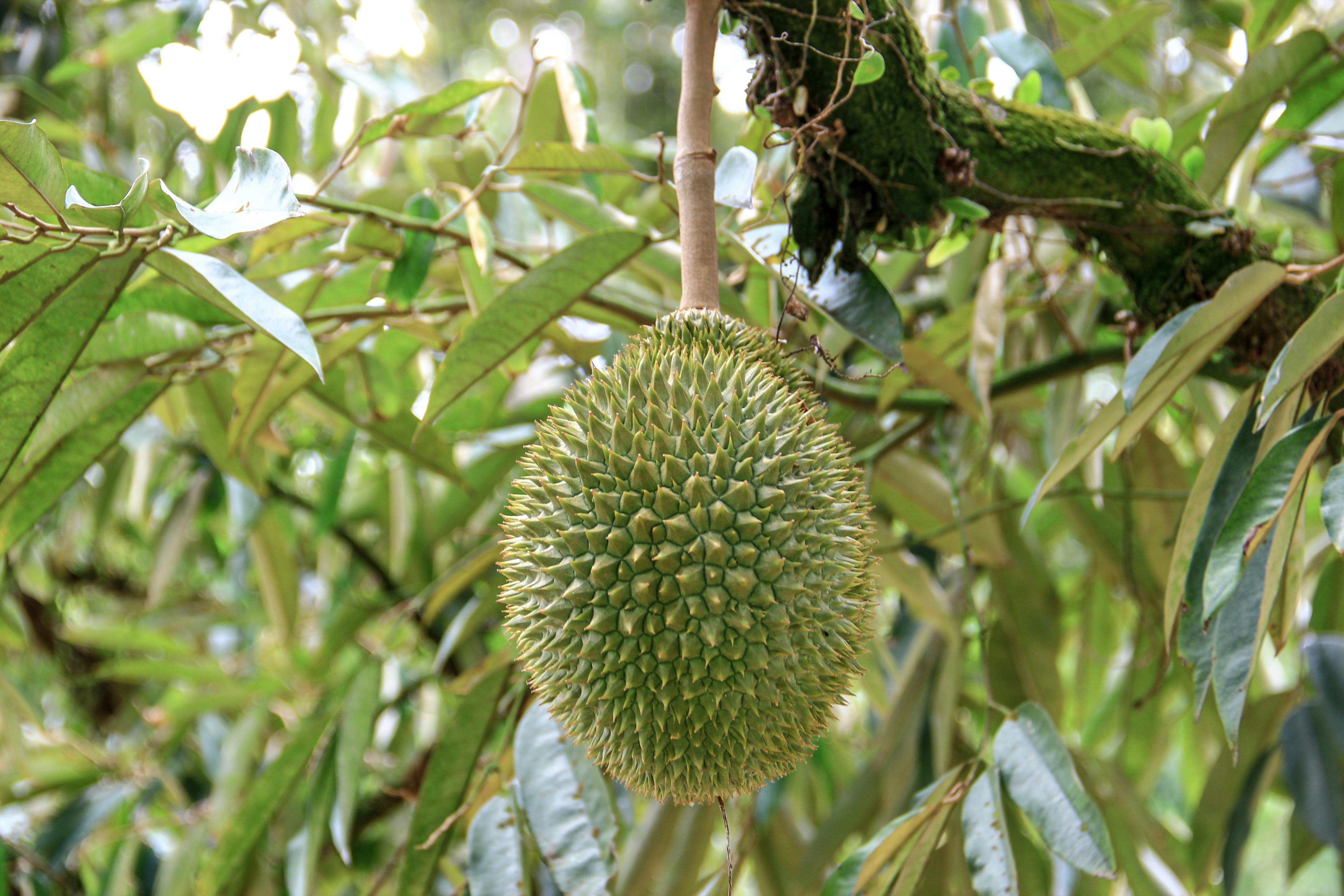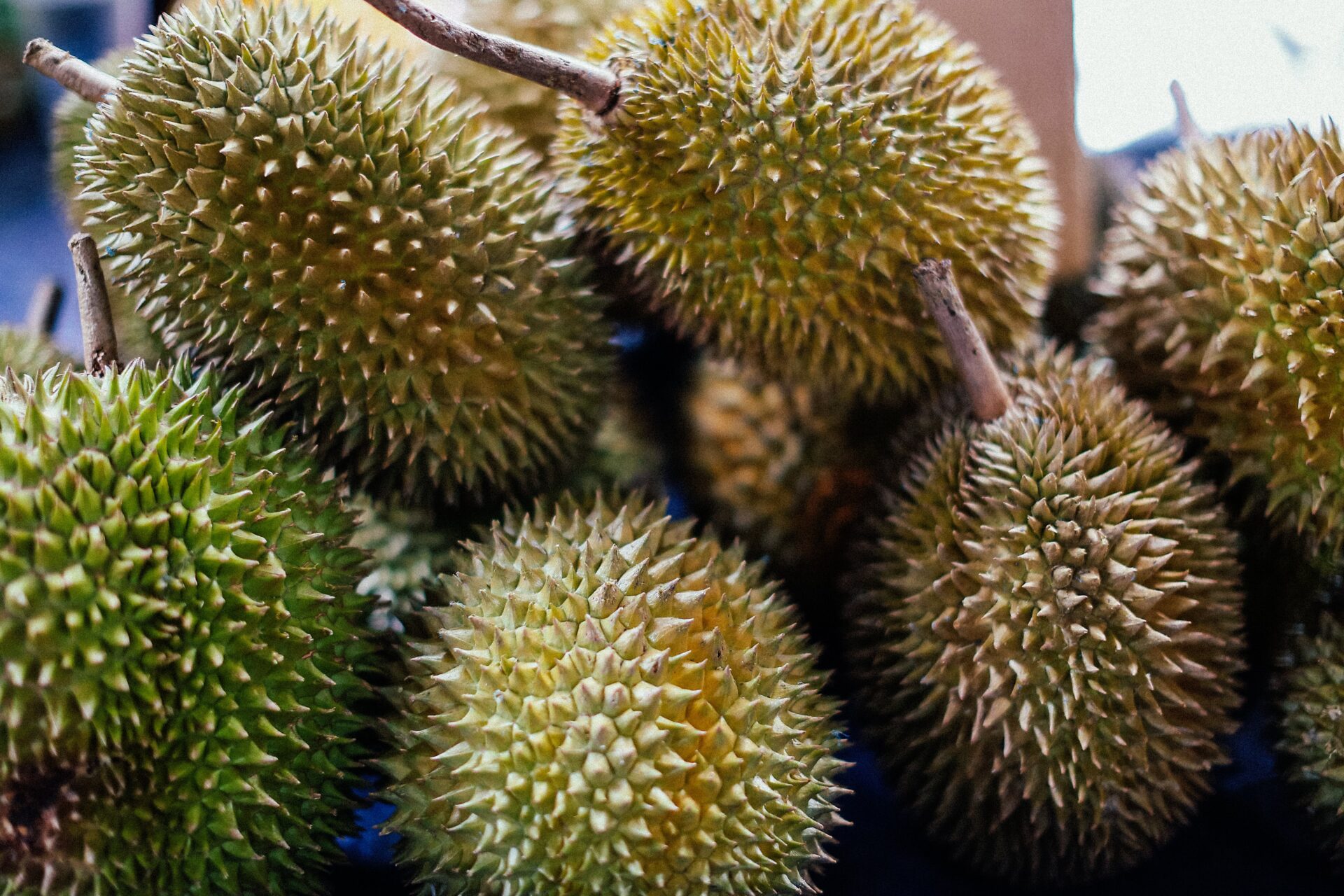Durian is commonly known as the king of fruits, and for good reason. It has a unique flavor and aroma that sets it apart from other fruits. Durian is native to tropical Southeast Asia, where it has been cultivated for centuries. Its taste can be described as an acquired one, with some people loving the strong flavor while others find it too intense. The spiky, green skin of durian also makes it hard to handle and transport, but these qualities are what make durian so special.Durian is a tropical fruit known for its large size, unique and strong odour, and its thorn-covered husk. It is native to Southeast Asia, and is widely popular in Malaysia, Thailand, Indonesia, Laos, Cambodia, Vietnam, and the Philippines. The flesh of the durian is creamy and sweet when ripe, but can have an off-putting smell when overripe. Despite its strong smell it is beloved by many for its rich flavour.
Origin of Durian Fruit
The durian fruit is native to southeast Asia and is believed to be indigenous to Brunei, Indonesia, Malaysia and Thailand. It has been cultivated in these areas for centuries. The durian tree is a large evergreen that can reach up to 40 meters in height, and the fruit it produces can weigh up to three kilograms. Durians are often referred to as the “king of fruits” due to their unique flavor and texture. They have a strong odor that some people find unpleasant, but many people consider them to be a delicacy.
The exact origin of the durian fruit is debated among experts, but it is believed that it originated in Southeast Asia thousands of years ago. It was first mentioned in written records from the 13th century AD by Chinese explorer Zhou Daguan, who noted its popularity among locals during his travels through modern-day Cambodia and Thailand. The fruit has since spread throughout the region, and today it is grown in India, Sri Lanka, Laos, Vietnam, Myanmar and the Philippines.
Durian fruits are an important food source in many parts of Southeast Asia where they are eaten raw or cooked into various dishes such as curries and desserts. The fruit’s soft spiky exterior gives way to a creamy interior filled with seeds that are rich in nutrients such as carbohydrates, proteins and fats. Durians also contain antioxidants such as vitamin C which can help protect against disease.
Durians have a long history of being an important part of cultural life in Southeast Asia, often used for medicinal purposes or presented as gifts during celebrations like weddings or festivals. The durian tree serves an important role in local ecology as well; its leaves provide food for animals such as monkeys and birds while its roots help stabilize soil on hillsides and prevent landslides caused by heavy rains.
Overall, the durian fruit has been part of Southeast Asian culture for many centuries thanks to its unique flavor and nutritional value. It continues to be a popular food source across the region today despite its strong odor which may not be pleasing for everyone’s taste buds!
Nutritional Benefits of Eating Durian
Durian is a tropical fruit native to Southeast Asia and is known for its unique taste and smell. It is also an excellent source of vitamins, minerals, and other essential nutrients. Durian offers a variety of health benefits, including improved digestion, healthy skin, and even improved heart health. Here are some of the nutritional benefits of eating durian.
Durian is a rich source of vitamins and minerals, including vitamin C, B-complex vitamins, calcium, magnesium, phosphorus, iron, and potassium. It also contains small amounts of zinc and selenium. These nutrients help to support the body’s immune system, as well as its metabolism and energy production. Vitamin C helps to protect cells from free radical damage while B-complex vitamins help to promote healthy skin and hair. Calcium helps to strengthen bones while magnesium helps to regulate blood pressure.
Durian is also an excellent source of dietary fiber which helps to improve digestion and keep the digestive system running smoothly. It also has a low glycemic index which can help to control blood sugar levels in those with diabetes or pre-diabetes. Additionally, durian contains antioxidants that can help to protect the body from free radical damage that can lead to various illnesses such as cancer.
The healthy fats in durian can also help to reduce cholesterol levels in the body which can improve cardiovascular health. The high levels of potassium in durian can help to lower blood pressure levels while its magnesium content can help relax blood vessels for better circulation throughout the body. Furthermore, durian contains tryptophan which helps the body produce serotonin that can have calming effects on the mind.
Overall, durian is an excellent source of essential vitamins and minerals that provide numerous health benefits for those who consume it regularly. Eating durian regularly may improve digestion, reduce cholesterol levels for better cardiovascular health, provide protection from free radical damage for overall wellness, boost energy production due to its vitamin content ,and even improve mood due to its serotonin production capabilities .
The Taste and Smell of Durian Fruit
Durian is a fruit that has an incredibly strong smell, but also a unique taste. The taste of durian is hard to describe, but many compare it to a combination of sweet and savory flavors. The texture is creamy and custard-like, with some people claiming it tastes like custard with notes of caramel or butter. Durian has a unique flavor that many find very enjoyable. It’s often used in desserts, such as cakes and ice cream.
The smell of durian, on the other hand, can be very off-putting to some. It’s an incredibly pungent odor that has been described as rotting onions or sweaty socks. The smell can be so strong that it’s banned from public places in some countries! But if you can get over the smell, there are many who say the flavor is worth it.
Durian is one of those foods that you either love or hate. Those who love it often compare its taste to caramelized bananas or custard with sweet undertones. Those who don’t enjoy it will likely never forget its offensive odor. But for those willing to give durian a try, they may just find themselves enjoying one of the most unique fruits in the world!
Various Varieties of Durian Fruits
Durian fruits are a delicious and unique fruit found in the tropical climates of Southeast Asia. While there is only one species of durian, there are many different varieties. The most popular and commonly eaten durians are Musang King, Red Prawn, D13, and D16.
Musang King durians are known for their rich and creamy texture. They have a sweet yet savory flavor that some people compare to caramel. This type of durian has an intense aroma that can fill up a room with its scent. It is also one of the more expensive types of durian available on the market.
Red Prawn durians have a distinctively sweet flavor and are smaller in size than other varieties of durians. The flesh is sticky and creamy, which makes it perfect for adding to desserts or eating on its own as a snack. Red prawns have a subtle aroma that does not overwhelm the senses like some other varieties of durian can.
D13 and D16 durians are popular among people who like their fruit to be slightly tart and fruity, as these two varieties tend to be less sweet than other types of durians. They have a stronger aroma than Musang King or Red Prawn but not as intense as some other varieties. The flesh is firm yet still creamy, making it great for adding to salads or using in cooking recipes.
Durian fruits are widely available throughout Southeast Asia but can also be found in other parts of the world such as Europe and North America. Whether you like your fruit sweet or tart, there is sure to be a variety of durian that will suit your tastes!

Health Benefits of Durian Fruits
Durian fruits are considered a superfood because of its nutritional content. It contains a wide range of vitamins and minerals, including Vitamin B6, Vitamin C, iron, magnesium, potassium, and zinc. It is also a great source of dietary fiber. The health benefits of durian fruits include improved digestion, improved cardiovascular health, increased energy levels, and enhanced immunity. Additionally, it helps to reduce inflammation and protect against certain types of cancer.
The high content of Vitamin B6 in durian fruits makes them ideal for regulating the body’s metabolism and keeping cholesterol levels in check. They also help to reduce stress levels and improve cognitive performance. Durian fruits are known to contain significant amounts of antioxidants which can help to protect the body from oxidative damage caused by free radicals. Furthermore, it can help to reduce the risk of certain types of cancer by fighting off carcinogenic cells.
Durian fruits are rich in essential fatty acids which can help to keep the heart healthy and reduce the risk of stroke or other cardiovascular diseases. Additionally, they can help to reduce blood pressure levels by maintaining healthy blood vessels. In addition to providing essential fatty acids, durian fruits contain high amounts of dietary fiber which aids in digestion and helps to maintain regular bowel movements.
The high content of potassium in durian fruits makes them beneficial for maintaining healthy bones and muscles as well as promoting proper nerve function. Additionally, they can help to improve energy levels by providing fuel for physical activity and exercise. Lastly, the high content of Vitamin C helps to strengthen immunity and fight off infections more efficiently.
In conclusion, durian fruits offer numerous health benefits due to their impressive nutritional content. They are an excellent source of essential vitamins and minerals as well as dietary fiber which aids in digestion and helps maintain regular bowel movements. Moreover, they contain various antioxidants that can protect the body from oxidative damage caused by free radicals and reduce the risk of certain types of cancer. Furthermore, they provide essential fatty acids that keep the heart healthy while also boosting energy levels for physical activity or exercise. Lastly, they are an excellent source of Vitamin C which strengthens immunity against infections
How to Select Durian Fruits
When selecting durian fruits, it is important to look for a fruit with a strong aroma and bright yellow color. It should feel heavy for its size and have no brown spots or bruises on the skin. Gently press the durian and if it yields slightly, that means it is ripe and ready to eat. If the durian is too hard, then it has not reached its peak ripeness yet. Avoid durians with soft spots or mold as this could be a sign of rot. When selecting durians, make sure they are at their peak ripeness so you can enjoy them at their best flavor.
How to Store Durian Fruits
Durians should be stored in a cool, dry place away from direct sunlight. They can last up to several weeks if kept refrigerated but will start to spoil quickly once exposed to temperatures above 75°F (24°C). If you plan on storing durians for an extended period of time, they should be frozen in an airtight container or plastic bag as this will extend their shelf life considerably. Be sure to remove any excess air when freezing as this will help retain flavor and texture when thawed out later. Durians can also be canned in syrup or frozen in cubes for easy use in recipes or smoothies.
Introduction
Durian is a tropical fruit known for its unique taste and aroma. It is native to Southeast Asia and can be found in many countries in the region. Durian has a strong smell, which can be off-putting to some people, but it is also considered an acquired taste. Eating durian can be an interesting experience, as it has a distinct flavor that many people enjoy. In this article, we’ll discuss how to prepare and eat durian fruits.
How to Prepare Durian Fruits
Durian fruits should be handled with care as they are quite delicate. The best way to prepare them is by cutting them in half and scooping out the flesh with a spoon. If you’re not comfortable with cutting the fruit open yourself, you can ask your local grocer or market seller for assistance. Once opened, remove the seeds from the flesh before consuming it.
How to Eat Durian Fruits
Eating durian can be an acquired taste for some people as the flavor can be quite strong. Start by trying a small piece of durian flesh and see how you like it. You can also add sugar or honey to make it sweeter if you prefer. Durian flesh can also be added to various desserts such as ice cream or custard for a unique flavor profile.
Conclusion
Durian fruits are an interesting and flavorful fruit that may take some getting used to if you’ve never tried them before. Prepare them carefully by cutting them open and removing the seeds before eating them. You can start by tasting small pieces of durian flesh or adding it to various desserts for an interesting flavor profile.

Conclusion
Durian may not be the king of all fruits, but it surely is the king of Southeast Asian fruits. The fruit has a unique flavor and aroma that will linger in your mouth for a long time. Durian is also very nutritious and has many health benefits.
Durian may be an acquired taste, but if you can get past its smell and taste, you’ll find that it’s a delicious fruit with many health benefits. It’s definitely worth giving it a try!
Overall, durian truly deserves its title as the “King of Fruits” in Southeast Asia. Its unique flavor and aroma make it stand out among other fruits, while its nutritional content makes it a great addition to any diet. Durian is definitely one fruit that everyone should try at least once!



